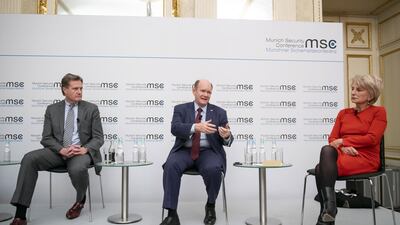An abrupt US withdrawal from Syria and Afghanistan will have ripple effects in the region and open the door wider to Russia and Iranian influence in the Middle East, Democrat Senator Chris Coons warned on Monday at the Royal United Services Institute (RUSI) in London.
“If we are talking about a future where the United States and its regional allies have no forces on the ground… I think we are suddenly looking at a regional ascendant Iran with consequences that we are to take quite seriously,” Mr Coons said after attending the Munich Security Conference, which came to a close last weekend.
“I strongly support a continued presence of US forces on the ground in Syria and Afghanistan to retain the capacity to prevent groups like al Qaeda, ISIS, from establishing strongholds and launching again attacks against our nations.”
The absence of “meaningful consultation” with Congress on the plans to withdraw US troops, as well as with regional and international allies, “gravely concerns me”, Mr Coons said.
“It frustrates me deeply to think that such behaviour may cause our allies across Asia and Europe to wonder if they might be the next American partner to be abandoned.”
This year’s Munich Security Conference — an event that was conceived during the Cold War — largely fell short of its intent to showcase the solidity of the post-war Western alliance and America’s commitment to European security.
The estrangement between the US and the EU has grown out of a number of issues including the Iranian nuclear deal, climate policy, trade and commitment to NATO. President Donald Trump’s abrupt announcement on Twitter of plans to withdraw US troops from Syria and to remove up to half of the 14,000 US forces in Afghanistan is the latest strain in the relationship between the transatlantic partners.
Mr Coons was among those senators who presented an amendment last month that challenges President Donald Trump's plans. The non-binding amendment, which would be attached to a bill on broader US policy in the Middle East, warns that a precipitous withdrawal of US forces could allow terrorists to regroup and create vacuums that could be filled by Iran or Russia.
Mr Coons – who was one of 68 senators to vote in favour – said more should be done. “In my mind, Congress can and should do more,” he said.
While the US cannot expect a clear-cut battlefield victory after decades of military engagement in the region, Mr Coons said the US “can lose, and we can lose decisively.” A US withdrawal could mean the resurgence of an ISIS-like groups, a surge in Russian and Iranian influence in the region and the loss of US credibility as an ally and peace-keeper on the international level.
The US-backed Syrian Democratic Forces launched an offensive earlier this month to oust ISIS from its last enclave in the town of Baghouz Al-Fawqani in the country's east. Mr Coons said he believed that US partners may not be there after April if the US ends its key protection role.
Additionally, voices demanding the withdrawal of its troops from Iraq will also grow louder, weakening an already tentative grip on the country and opening it up further to Iranian influence.
Backers of Mr Trump’s move argued that the US should focus on more pressing issues – such as the perceived immigration emergency at the border with South America – and that a US withdrawal from the Middle East is long-overdue.
"It is time to bring our troops home from Afghanistan and Syria," Senator Rand Paul, who backed Mr Trump, said on Twitter. "It is ludicrous to call withdrawal after 17 years 'precipitous.'"
Mr Coons claimed this move would be a mistake born out of the president’s own skewed vision of international politics.
“The core problem is a president who thinks alliances make us weak and that the alliances that have produced our prosperity and security have in fact crippled us,” he said.

